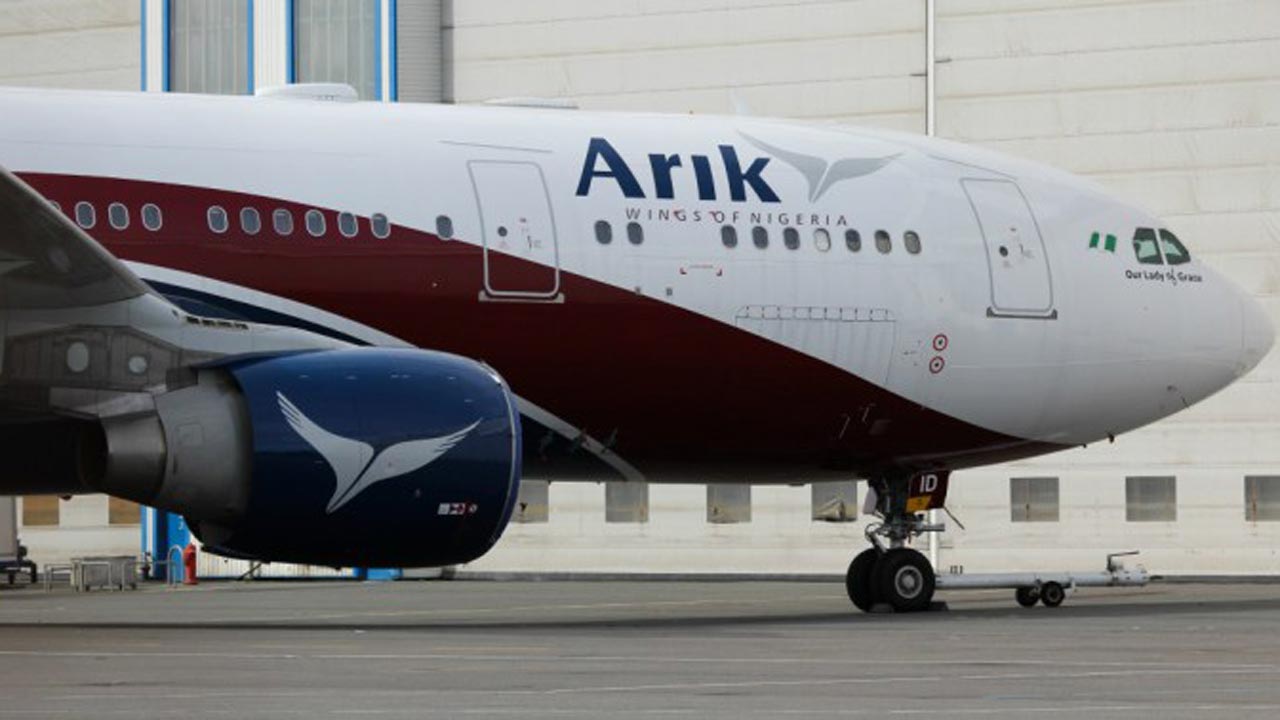- Arik suspends flights to London, Johannesburg
The new management of Arik Air has announced the suspension of its international flight operations to enable the carrier find permanent solutions to the problem of delays and cancellation of flights.
The airline said the decision was aimed at realigning operations and refocusing on satisfying its domestic, West African and other international passengers.
The management said in a statement on Tuesday, “This is to bring to the notice of our travelling public our intention to suspend our international flight operations to enable us find permanent solution (to the problem) facing our passengers as it will enable us to carry out a thorough assessment of the situation.
“It will also present Arik with an excellent opportunity to engage and discuss with creditors, who have become restive since the intervention, and have also understandably exhausted their patience due to non-payment of accumulated debts and non-performance on services and contracts.”
The airline said arrangements were being made to refund all international passengers affected by the decision.
It added, “To our international creditors, Arik is most grateful for your patience and understanding. We reassure them that all pending issues with the airline will be duly addressed as a matter of priority as we plan to engage them in this regard.
“The international route is very critical for the strategic turnaround, growth strategy and stability of the airline. Therefore, we intend to revisit the routes immediately we address all the problems inherited, which are affecting and creating more dissatisfied passenger base. We appeal to all passengers to kindly bear with us as the decision is to ensure that the airline adheres strictly to international aviation best practices.”
Meanwhile, the Asset Management Corporation of Nigeria has taken over Odengene Air Shuttle Services Limited, operators of the OAS Helicopters.
AMCON took over on Tuesday, February 14, 2017, following a possessory order granted by Justice Chuka Obiozor of the Federal High Court, Lagos over the assets and property of the company due to an outstanding debt.
Odengene Air Shuttle Services Limited is an indigenous aviation company registered by the Corporate Affairs Commission on February 4, 1992 and licensed by the Nigeria Civil Aviation Authority to render flight services.
According to the company’s website, its flight outfit covers rotary and fixed wing, with the rotary wing being operated under OAS Helicopters, while the fixed wing is operated as Odengene Air.
The helicopter wing of the company, OAS Helicopters, commenced commercial flight in February 2006.
The company’s debt profile has not been revealed, but AMCON’s official takeover seal which read, “Possession taken today 14/2/17 by AMCON by court order in suit NO. FHC/4CS/1139/2016,” was pasted on Tuesday.
The development is coming few days after AMCON intervened in Arik Air by taking over its operations.
The Head, Corporate Communications, AMCON, Mr. Jude Nwauzor, who confirmed the takeover of OAS Helicopters to our correspondent in an email, said assets and immovable properties of the company had been taken over by the corporation’s solicitors.
“AMCON has increased the tempo of its recovery activities using firmer negotiation strategies as well as utilising the special enforcement powers vested by the AMCON Act to compel some of its recalcitrant debtors and business heavyweights to repay their debts,” he added.

 Naira4 weeks ago
Naira4 weeks ago


 Naira4 weeks ago
Naira4 weeks ago


 Naira3 weeks ago
Naira3 weeks ago


 News4 weeks ago
News4 weeks ago
 Travel4 weeks ago
Travel4 weeks ago




 Naira4 weeks ago
Naira4 weeks ago


 Jobs3 weeks ago
Jobs3 weeks ago
 Naira3 weeks ago
Naira3 weeks ago






















